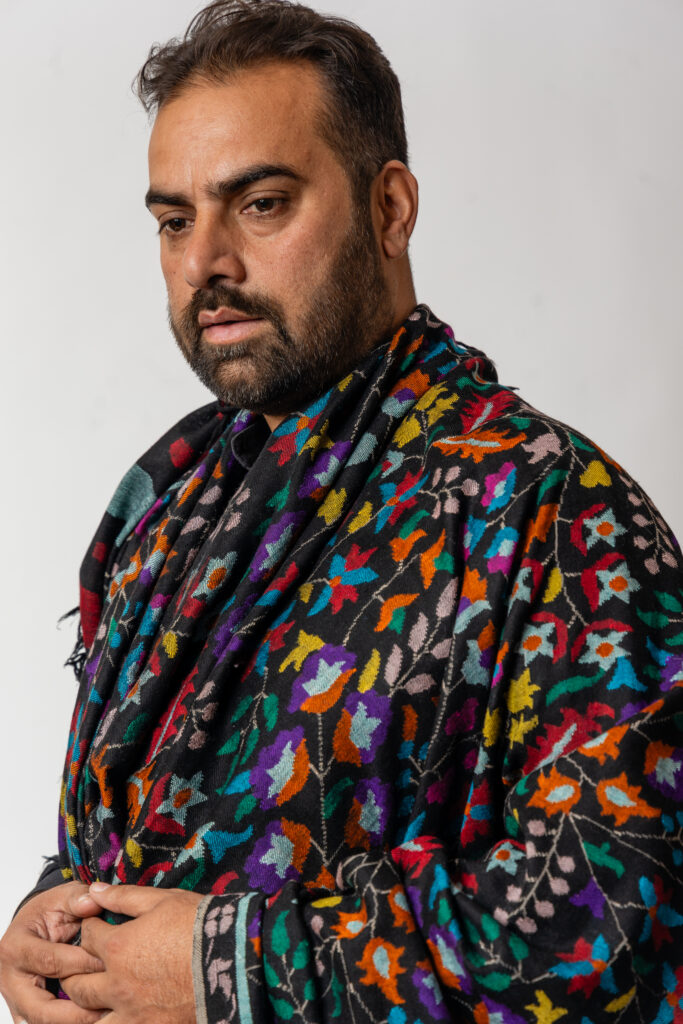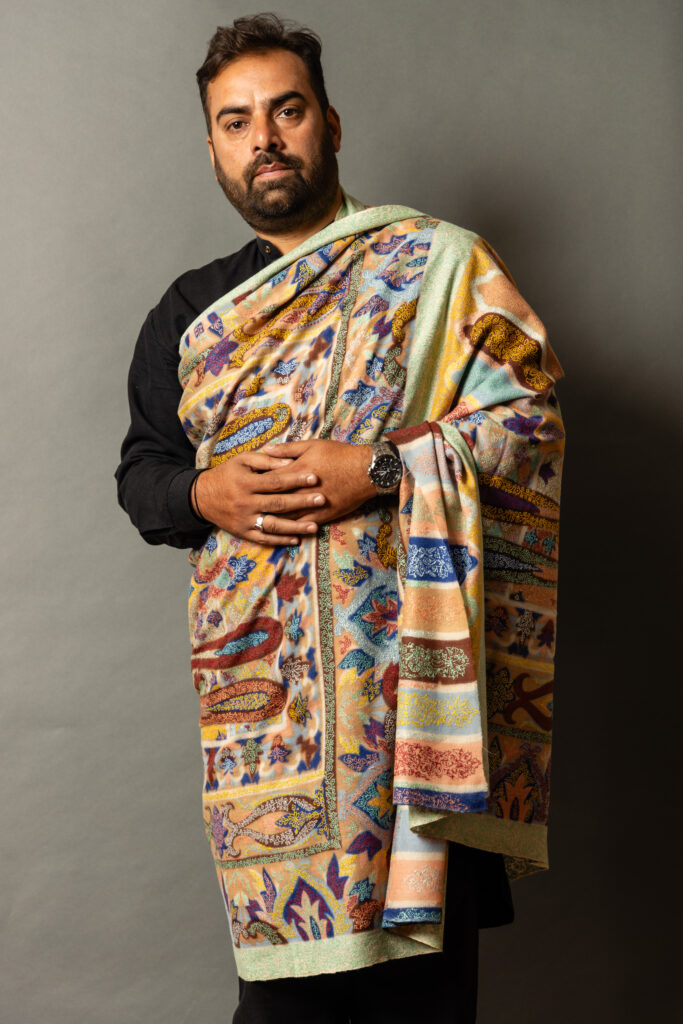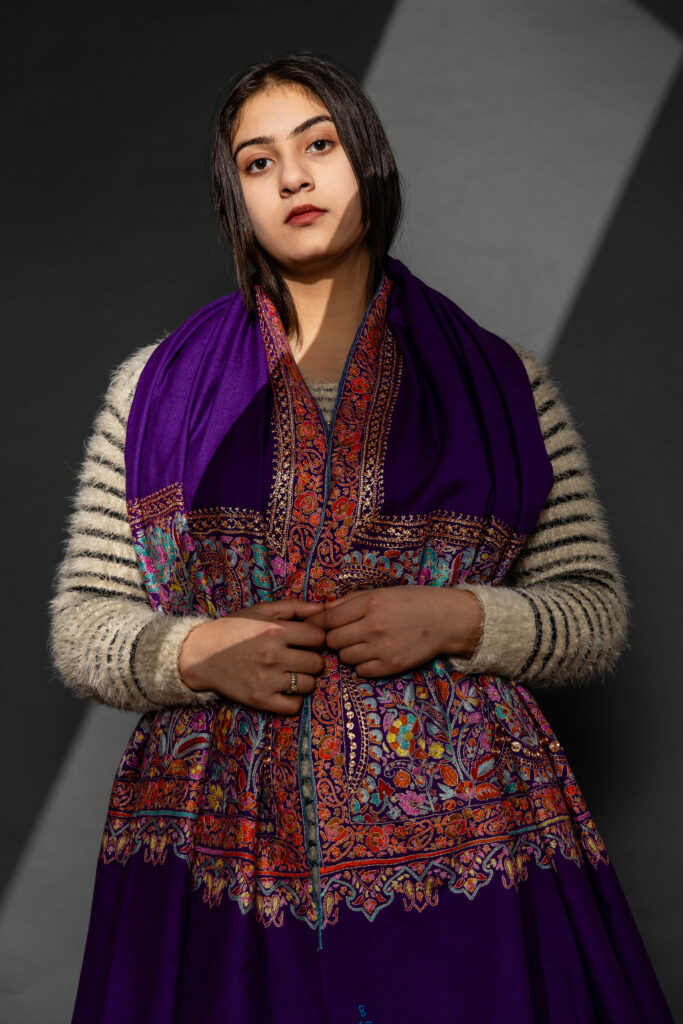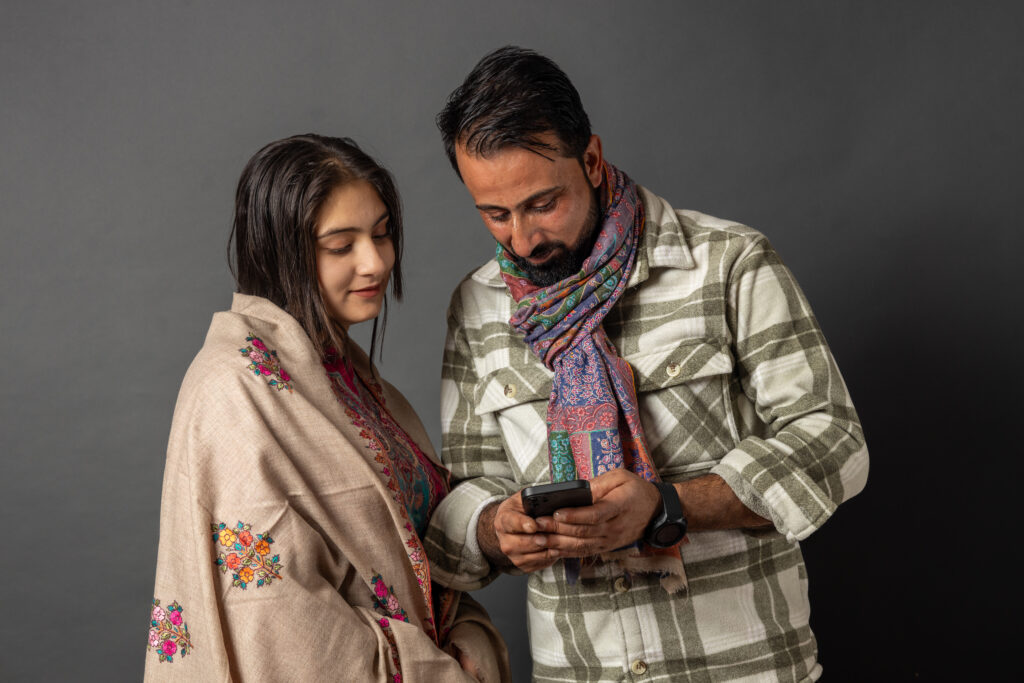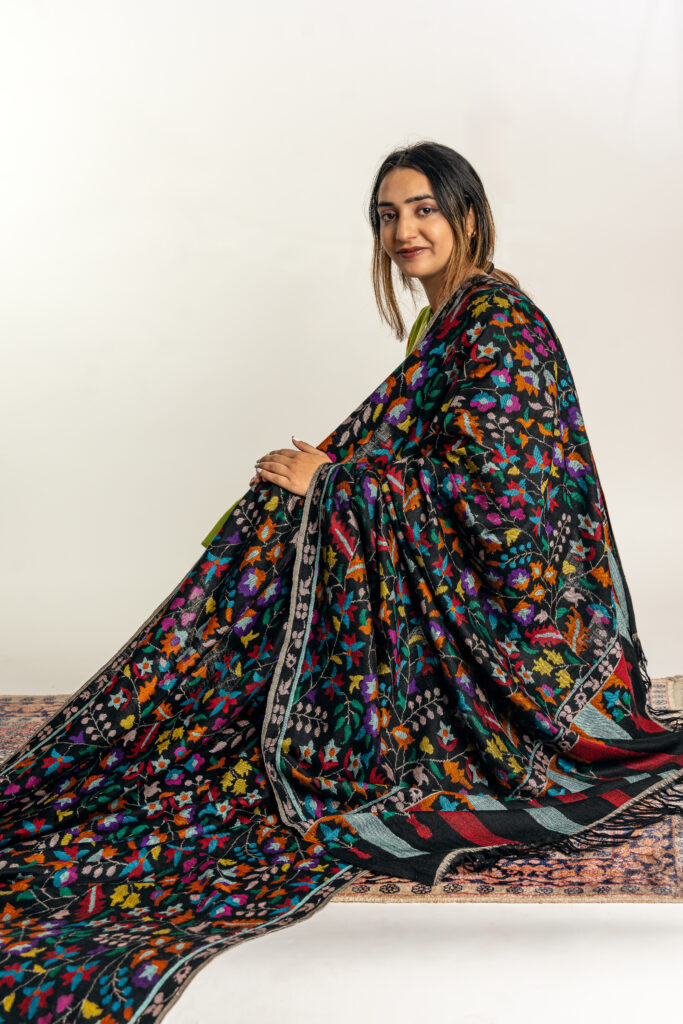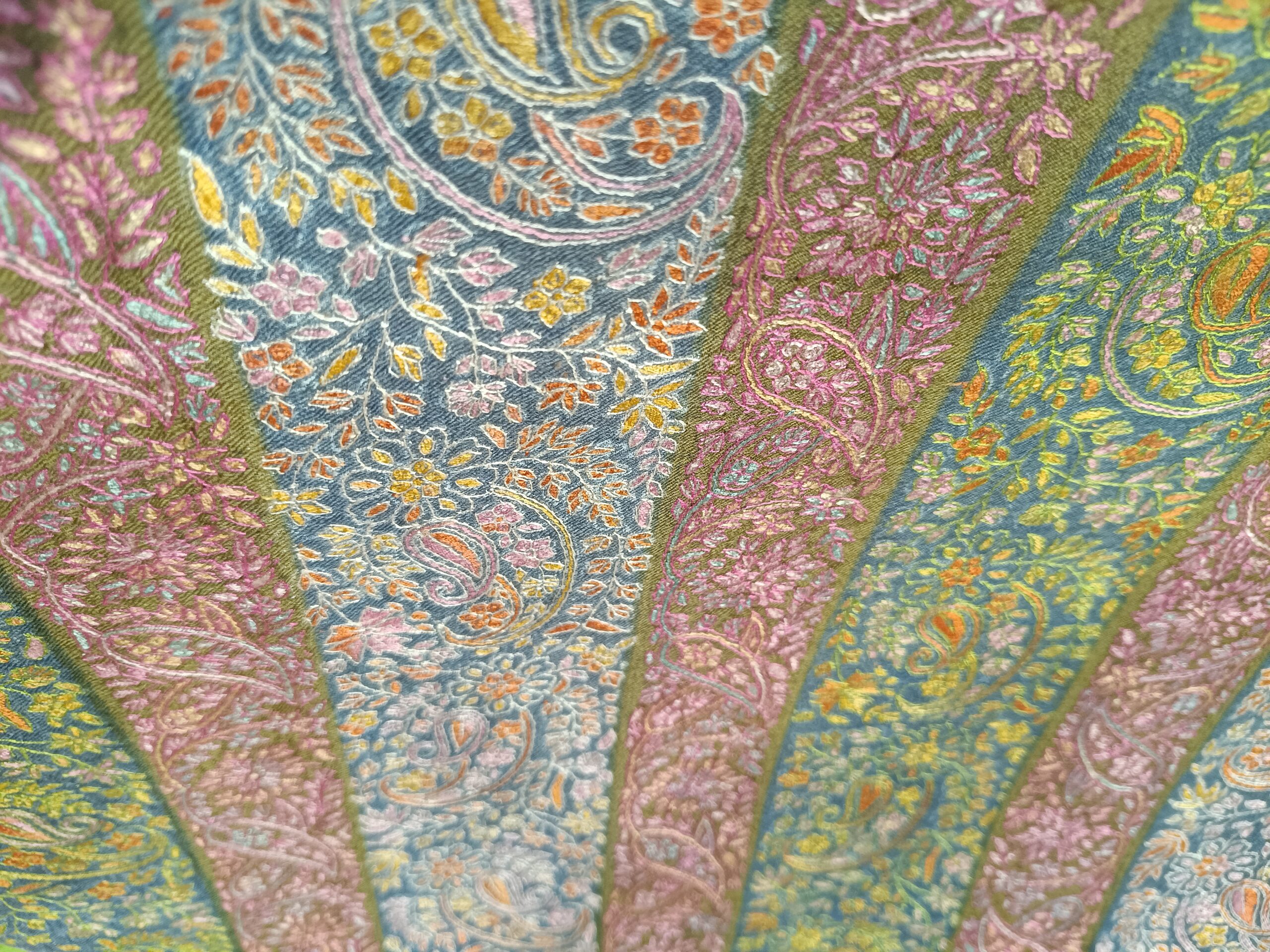
Craft, Culture and Kashmir: The Tale of Kani Pashmina by NEEDLEKAR–KASHMIR
- EntrepreneurFashionSustainable
- November 20, 2024
- No Comment
Kashmir and Pashmina, a sacred bond deeply rooted in the valley’s rich culture and textile heritage. Pashmina, often referred to as cashmere is derived from the fine wool of the Changthangi goat, native to the high-altitude regions of the Himalayas, particularly in Ladakh and parts of Kashmir.
In the divine valley of Kashmir, the art of weaving Pashmina has been perfected over centuries, with artisans employing traditional techniques to create intricate designs and patterns, the region’s unique climate and natural resources contribute to the high quality of Pashmina wool.
Brand Story
For a very long time, the Ganai family in Srinagar has been carrying forward the Kashmiri legacy of Kani Sozni art, a form of needlework, on Pashmina Shawls. The art of KANI SOZNI, on Pashmina shawls, has been a work of the very 1st family in Srinagar “Ganai Family” for four generations now.
In 1981, extending the legacy of his family, Ghulam Muhammad, a Kashmiri native from the Zoonimar, downtown area of Srinagar, along with his brother Ghulam Mohi Din Ganie brought their family business into the limelight under the name “The Ganai Brothers.” A factory and 30-40 artisans, were all that left after Ghulam Muhammad’s father handed over the business to the next generation.
Ghulam Muhammad has been fascinated with art since childhood, growing up watching his father and the community around him create exquisite shawls. He learnt this legacy art from his father Late Ghulam Rasool Ganai & his uncles, who had learnt it from their father as the Ganai family has been making Sonzi shawls for centuries.
The family has received several awards on this legacy art for outstanding contribution to Indian handicrafts, which was first given to the Ganai brothers in 1982-83.
The fine craft even spread its enchantment on Foreigners who visited Kashmir and Ganai Brother’s premises. Some of them advised to start the branding and Ghulam Muhammad followed suit.
In July 1988, a series of demonstrations, strikes, and attacks on the Indian government effectively marked the beginning of the insurgency in Jammu and Kashmir. This insurgency left its mark on the Ganai Brothers’ Business. Everything came to a standstill, which also impacted the business.
Several years later people started knowing “The Ganai Brothers” as a brand– “Needlekaar – Kashmir”. Founded in 2002, the brand aims to revive the dying tradition of shawl making, support the artisans, empower the community, and ensure the authentic Cashmere Sozni embroidered remains a coveted possession.
The Artisans and Craftsmen
The lead artisan, Gulam Muhammad Baba, a close friend of Ghulam Mohi Din Ganai, has been associated with the Ganai family for over two decades.
Ghulam Muhammad Ganai has now involved a great number of skilled artisans from Kashmir in this art to keep this delicate heritage alive. He has trained approximately 300 artisans for this legacy craft to date including married women and widows alike.
The present generation could also not stay indifferent to the beauty of Kani Sonzi Pashmina Shawls and have joined hands in taking this family legacy to new horizons. Gulam Muhammad Ganai’s nephews, Er Sajid Ali (co-founder), came aboard as the craft designer and Aashiq Hussain as the Marketing Head of NEEDLEKAR–KASHMIR.
Onset of a New Hope
2014, marked the beginning of a new dawn. With BJP and Modi Sarkar, things changed for the Kashmiri people and the trade as well. Honourable PM Mr Narandra Modi Ji himself has endorsed the Pashmina shawl of Needlekaar – Kashmir.
Intricate Weaves
Each Kani Sonzi Shawl takes 18 months to 3 years to complete. The time needed to knit a Kani Sonzi shawl varies based on the knitting speed, the complexity of the pattern, and the yarn thickness. In comparison to any other handloom product, Sonzi Pashmina shawls involve intricate weaves and designs. It requires complete dedication, perfection, and intense labour, hence, is one of the most expensive products available in the market.
Threats to Authentic Kani Sonzi Craft
Many manufacturers imitate the authentic hand-woven Kani Sonzi craft to manufacture machine-made shawls. These imitations look nearly the same in terms of patterns, weaves, and designs but are economical for buyers.
In addition to this, Economic Instability, Political unrest, and Resourse Scarcity are yet additional challenges that the craftsmen face in the Valley. Global market trends often favour mass-produced goods over artisanal products and the rise of fast fashion and synthetic alternatives poses a threat to traditional crafts, as consumers may opt for cheaper, mass-produced items. Many skilled artisans are ageing, and there is a lack of interest among younger generations to continue these traditional crafts, leading to a potential loss of heritage.
These challenges necessitate concerted efforts for support, preservation, and promotion of these invaluable crafts and the artisans behind them.
Distinguishing Authentic Kani Sonzi Pashmina:
Authentic pashmina is incredibly soft and has a luxurious feel. It should feel warm yet lightweight. Machine-made versions may feel coarser or heavier. Take time to examine the weave closely. Handmade pashmina features a more intricate, irregular pattern, while machine-made shawls often have uniform patterns that lack the subtle nuances of handwork. Genuine Kani Sonzi pashmina has a natural sheen and depth of colour that comes from the dyeing process. Machine-made shawls may look overly bright or uniform in colour.
Look for GI (Geographical Indication) tags or labels indicating authenticity, such as those from recognized organizations that promote genuine Kashmiri crafts.
Adorned with intricate patterns and vibrant hues, these shawls are not merely garments but cherished heirlooms, embodying the rich cultural tapestry of Kashmir. This luxurious accessory is not merely a statement of style but a celebration of tradition, inviting connoisseurs to drape themselves in a narrative rich with history and elegance. The Kashmiri Kani Sonzi pashmina shawl transcends mere fashion; it is an exquisite embodiment of artistry and cultural heritage, a lyrical testament to the craftsmanship of the Himalayas.



